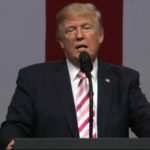Better relations with China used to be a bipartisan issue in Washington.
Beginning with Richard Nixon’s history-making visit to Beijing in 1972, subsequent administrations — both Democrat and Republican — worked to improve relations with Beijing.
Democrat Jimmy Carter formally recognized the People’s Republic of China over Taiwan, Republican George H.W. Bush maintained dialogue with Chinese leaders in the years following the Tiananmen Massacre, and Democrat Bill Clinton supported China’s membership in the World Trade Organization (WTO).
That sense of steadiness and dependability has begun to unravel during President Donald Trump’s time in office. This week, he ramped up a crackdown on Chinese telecoms giant Huawei, amid a worsening trade war with Beijing that is causing economic hardship on both sides.
But while there are many topics where Trump is an iconoclast, out of step with some of his Republican colleagues, let alone the Democrats, this is not it. Bipartisan consensus has swung hard against Beijing in recent years, with some opposition lawmakers in Washington even calling on Trump to take a harder approach.
“There is a broad hawkishness on China that straddles left, right, and center,” said Patrick Lozada, China director at the Washington-based strategic advisory firm Albright Stonebridge Group (ASG). “The problem with this consensus is that in the absence of a credible counter-argument, the actual facts on the ground can sometimes be lost as people compete to see who can be more hawkish.”



